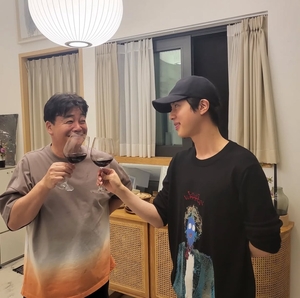
Celebrity-backed alcoholic drinks fuel sales and spotlight traditional liquor, but critics warn of risks to youth and social responsibility
K-pop idols and celebrities are increasingly stepping into the alcohol business, creating both opportunities and concerns in one of Korea’s most tightly regulated industries.
The trend made headlines again after Jin of BTS, who co-founded the agricultural corporation Jini’s Lamp with celebrity chef and entrepreneur Paik Jong-won, was reported to authorities this month for alleged labeling law violations.
Jini’s Lamp, which launched its distilled spirit IGIN in December 2024, produces the liquor in-house, while Paik’s affiliated company handles distribution. The case reignited debate over whether K-pop stars should be in the alcohol game at all.
Growing celebrity market
Since rapper Jay Park introduced his Won Soju brand in 2022, a wave of celebrities have released their own liquor brands. Singers like Lim Chang-jung, Kim Min-jong and Yoon Mi-rae all jumped into the soju market, often in collaboration with local convenience stores. Yet public enthusiasm quickly faded as similar concepts crowded shelves and demand slowed except for whiskies and ready-to-drink cocktails.
Momentum picked up again in late 2023, but this time with a twist: Jay Park aside, celebrities had previously only lent their names to products, but now they were taking a more active role. Jun directly invested in his distillery, while stars like T-ara’s Hyomin, JYJ’s Kim Jae-joong and Big Bang’s G-Dragon all collaborated with breweries or launched their own brands in recent years.

According to market research firm Embrain, Tuesday, sales of celebrity alcohol products at major retailers in July reached an estimated 13.8 billion won ($9.84 million) in the past year, up 222 percent from the previous year.
Once dominated by curious young consumers, demand is now spreading across age groups. In 2024, people in their 20s accounted for 29.6 percent of sales, followed by those in their 30s at 25.7 percent, over-50s at 23.5 percent and 40s at 21.3 percent, showing a broadening appeal.
Success stories and cultural impact
For Korea’s traditional liquor industry, celebrity collaborations can be a lifeline. Singer Sung Si-kyung’s makgeolli, a type of traditional rice wine, launched earlier this year at a century-old brewery in Dangjin, reviving interest in a family-run business. G-Dragon’s Peaceminusone Highball sold out its initial run of 880,000 cans in just three days, setting a record for the local convenience store chain CU. The drink has since surpassed 10 million cans sold.
Industry insiders say such partnerships bring instant brand recognition and rapid sales growth.
“When we collaborate with a celebrity with a strong fandom, the consumer response and sales impact are immediate,” a local food and beverage company official said. “Competition to secure these influential IPs (celebrity names) is fierce.”

Concerns over youth and legality
Despite the commercial success, criticism is mounting over the social implications.
Korea’s Liquor Tax Act heavily regulates alcohol production and distribution due to its potential impact on public health.
While traditional liquors such as makgeolli are subject to fewer restrictions — making them more accessible to celebrity ventures — some see this as exploiting a legal loophole.
“Alcohol companies using celebrities with no expertise in order to market drinks runs against the intent of liquor laws,” an entertainment company official said Thursday. “K-pop idols especially have a huge influence over teenagers. Even without directly encouraging drinking, young fans may want to buy and collect alcohol products tied to their favorite stars, which risks promoting drinking among minors.”